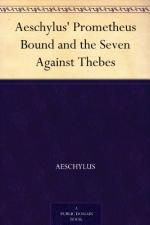|
This section contains 603 words (approx. 2 pages at 400 words per page) |

|
Audience
Audience is the people for whom a drama is performed. Authors usually write with an audience in mind. Aeschylus writes for an audience interested in drama as entertainment, but this is also an audience that would expect the playwright to include important lessons about life. Aeschylus also views this moral lesson as an important role for the dramatist and so he emphasizes important lessons in his plays. In there are lessons about the role of honor and of destiny, as well as lessons about hatred and facing death.
Character
A character is a person in a dramatic work. The actions of each character are what constitute the story. Character can also include the idea of a particular individual's morality. Characters can range from simple stereotypical figures to more complex multifaceted ones. Characters may also be defined by personality traits, such as the rogue or the damsel in distress...
|
This section contains 603 words (approx. 2 pages at 400 words per page) |

|




